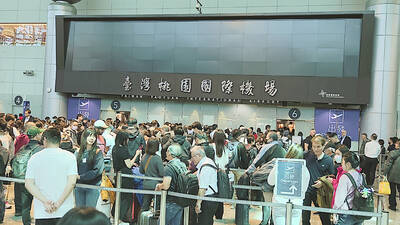Taiwan has opened five more Sinology resource centers in central and eastern European countries in the hope of increasing the exposure of Taiwanese research in Chinese studies, National Central Library (NCL) Director-General Tseng Shu-hsien (曾淑賢) said on Tuesday.
Tseng presided over the opening of branches of the NCL-run Taiwan Resource Center for Chinese Studies during her recent trip to five countries, including Vilnius University in Lithuania.
Four other schools that are hosting the centers are the University of Tartu in Estonia, Masaryk University in the Czech Republic, Comenius University in Slovakia and Eotvos Lorand University in Hungary, Tseng said.
The NCL wants to expand interest in Taiwan in general and is planning to open a “Taiwan Corner” in the national libraries of Estonia and Lithuania to display Taiwan-themed books, she said.
The first resource centers were established in 2012 in line with the government’s policy of promoting “Chinese culture with Taiwanese characteristics” through the publication of research by Taiwanese academics.
The 37 centers set up around the world as of September last year have served as sources of knowledge in the field of Sinology at their host universities and as a driving force in promoting research by Taiwanese academics at places of learning worldwide, Tseng said.
Through the centers, researchers can find Sinology-related materials online and from about 500 to 1,000 publications from Taiwan, ranging from topics in Taiwanese literature to the Constitution, she said.
The latest addition of centers in Europe is timely, as academics from those countries who have done research in Taiwan have praised the quality of Taiwanese works, but could not access the materials when they returned home, she said.

The National Immigration Agency (NIA) said yesterday that it will revoke the dependent-based residence permit of a Chinese social media influencer who reportedly “openly advocated for [China’s] unification through military force” with Taiwan. The Chinese national, identified by her surname Liu (劉), will have her residence permit revoked in accordance with Article 14 of the “Measures for the permission of family- based residence, long-term residence and settlement of people from the Mainland Area in the Taiwan Area,” the NIA said in a news release. The agency explained it received reports that Liu made “unifying Taiwan through military force” statements on her online

A magnitude 5.7 earthquake struck off Taitung County at 1:09pm today, the Central Weather Administration (CWA) said. The hypocenter was 53km northeast of Taitung County Hall at a depth of 12.5km, CWA data showed. The intensity of the quake, which gauges the actual effect of a seismic event, measured 4 in Taitung County and Hualien County on Taiwan's seven-tier intensity scale, the data showed. The quake had an intensity of 3 in Nantou County, Chiayi County, Yunlin County, Kaohsiung and Tainan, the data showed. There were no immediate reports of damage following the quake.

Actor Darren Wang (王大陸) is to begin his one-year alternative military service tomorrow amid ongoing legal issues, the Ministry of the Interior said yesterday. Wang, who last month was released on bail of NT$150,000 (US$4,561) as he faces charges of allegedly attempting to evade military service and forging documents, has been ordered to report to Taipei Railway Station at 9am tomorrow, the Alternative Military Service Training and Management Center said. The 33-year-old would join about 1,300 other conscripts in the 263rd cohort of general alternative service for training at the Chenggong Ling camp in Taichung, a center official told reporters. Wang would first

MINOR DISRUPTION: The outage affected check-in and security screening, while passport control was done manually and runway operations continued unaffected The main departure hall and other parts of Terminal 2 at Taiwan Taoyuan International Airport lost power on Tuesday, causing confusion among passengers before electricity was fully restored more than an hour later. The outage, the cause of which is still being investigated, began at about midday and affected parts of Terminal 2, including the check-in gates, the security screening area and some duty-free shops. Parts of the terminal immediately activated backup power sources, while others remained dark until power was restored in some of the affected areas starting at 12:23pm. Power was fully restored at 1:13pm. Taoyuan International Airport Corp said in a